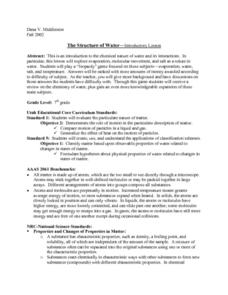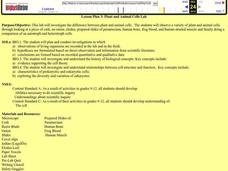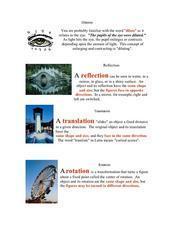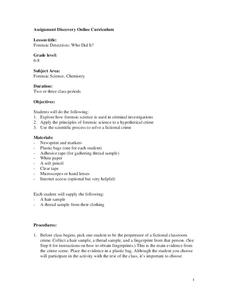Curated OER
Let It Snow!
Students make the most of the season's first snowfall with a snowflake study. They create original snowflakes from paper, collect authentic snowflakes on paper, and examine and compare the snowflakes.
Curated OER
The Chemistry of Hair Care
Students do hands-on activities and read information online in order to answer the central question of this lesson: How does understanding the chemistry of hair care, including the role of pH, help in the development of better hair-care...
Curated OER
BIoluminescence
High schoolers investigate the concept of bioluminescence. They use dinoflagellates in a lab situation to study photosynthesis. They conduct research into the concept using a variety of resources. Also the class is taken on a field trip...
Curated OER
Fish Parasite Survey
Pupils count nematodes, cestodes and crustaceans on approximately one-hundred and fifty fish. They fill out autopsy reports for external and internal parasites then complete and discuss guide questions to make inferences about parasite...
Curated OER
Shells on the Mountain Top?
Students work in groups to remove fossils from sediments, classifying as many organisms and parts of organisms as possible into major groups. They study the data from each formation and make conclusions about the types of organisms and...
Curated OER
Fish Parasite Survey
Students survey and dissect as many fish as possible. They count nematodes, cestodes and crustaceans on the fish, fill out autopsy reports, and transfer data to a chalkboard data table. Students graph the results of the entire class...
Curated OER
Winogradsky in a Bottle: Beginning a Winogradsky Column
Students use their measurement skills by marking a bottle for construction purposes. They record qualitative and quantitative data and analyze their results. Students demonstrate evaluation of a small scale systems as a model for the...
Curated OER
Fossil Impressions of Ancient Life
Students make a mold using Plaster of Paris and then make a cast using that same mold. They pick a fossil and describe how it looks. They write a fictionalized story about its life, or burial. (
Curated OER
Robert Boyle and Experimental Methods
Students discuss the difference between the Baconian inductive method and the Aristotelian deductive approaches. They complete a given set of questions then discuss them with the class.
Curated OER
Classification
Fifth graders analyze the necessity of classification. They distinguish between living and nonliving things in our world and recognize the six life functions of living things by identifying 15 classroom objects.
Curated OER
Introduction To Insect & Spider Body Parts
Students inspect several different specimens of insects and spiders to determine characteristics that are similar and different between the two groups. They identify the basic body structure of spiders and insects and then predict where...
Curated OER
Science Experiments - The Low-down
Third graders discover the process thinking about science experiments, and why they are important. They work in small groups using incline planes and a small toy car to design one scientific question that can be answered through...
Curated OER
Vibration and Pitch
Fifth graders investigate the relation between vibrations and pitch. They observe and discuss an experiment involving a bicycle and a piece of cardboard in the spokes, listen to a comb with cardboard, and listen to various sounds and...
Curated OER
Species Diversity and Phylogeny
Students explore the classification system of organisms: taxonomy. They examine prepared slides of Protozoans and record information on a Taxonomy Recording Sheet. Two additional classifying activities are also included in this lesson.
Curated OER
How Hot is Too Hot?
Fifth graders use the scientific method to conduct experiments on the temperature effects on organisms. In this temperature effects on organisms lesson plan, 5th graders observe and record the hatching or the developing of organisms into...
Curated OER
Brine Shrimp Anatomy
Third graders investigate the anatomy of the brine shrimp. They construct a model of the shrimp to demonstrate the anatomical parts of the shrimp. Students research the different factors that contribute to shrimp survival. Then they...
Curated OER
The Chemical Nature of Water
Seventh graders simulate a Jeopardy game to examine the chemical nature of water. Among the topics featured are evaporation, water, salt, and temperature. finally, as review, 7th graders answer a battery of questions presented by the...
Curated OER
Great Salt Lake
Fourth graders make an ecosystem that brine shrimp can live in and take data as to what level of salinity the water is, how cold it is, and other data that students may think is important. They also hypothesize and predict the outcomes...
Curated OER
Prior Knowledge Investigation-Food Webs
Students explore food webs. They identify any misconceptions of producers, consumers or decomposers and their relationship within a food web. Students draw an example of a food web for each of the examples that are given. They address...
Curated OER
Plant and Animal Cells
Students investigate the difference between plant and animal cells. They observe a variety o plant and animals cells by looking at a piece of cork, an onion, elodea, prepared slides of paramecium, human bone, frog blood, and human...
Curated OER
How Does a Liquid Become a Solid?
Students explore the energy changes from a liquid to a solid. They model the arrangement of a solid and the change in states due to changes in energy using desks and chairs. Assessment questions are provided in lesson plan.
Curated OER
Water Retention and Soil Variation in Local Ecosystems
Students identify the differences in local soil types and the relationship between soil size and water retention. They are introduced to microenvironmental conditions in ecosystem sustainability.
Curated OER
Dilation
Tenth graders identidy and define various geometry terms, Students create exact replicas of a shape that is either smaller or larger than the original shape. Students prove that their entire shapes are larger or smaller in the same...
Curated OER
Forensic Detectives: Who Did It?
Students explore forensic science and its uses in criminal investigations. They solve a fictional crime by identifying and analyzing the fingerprints, strand of hair, and thread samples for evidence. After completing charts for each,...
Other popular searches
- Microscopic Images
- Microscopic Microbes
- Microscopic Organisms
- Microscopic Pond Life
- Microscopic Images of Ferns
- Microscopic Field of View
- Microscopic Indicator Chart
- Microscopic World
- Macroscopic Microscopic
- Microscopic Animals
- Microscopic Life
- Microscopic Organisms Models

























